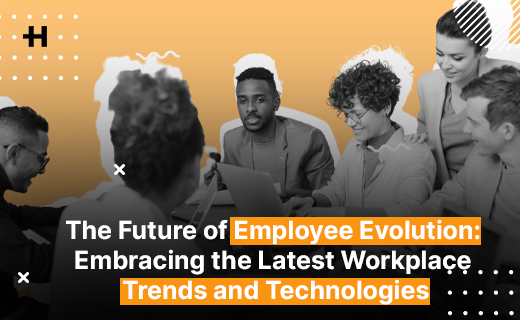Organizations and employees alike navigate the ever-changing landscape of the modern workplace. With technological advancements, changing attitudes toward work-life balance, and an increased focus on soft skills, the modern employee must be adaptable and willing to embrace change to stay relevant and competitive. Employee Evolution refers to the ongoing process of learning, growth, and development that employees must undergo to keep up with the changing workplace. It involves staying up-to-date with the latest technology, developing new skills, adapting to new work arrangements, and prioritizing work-life balance. By continuously evolving, employees can enhance their job performance, increase job satisfaction, and open up opportunities for career advancement.
In this article, we will delve deeper into the concept of employee evolution and explore the various approaches to employee development, including on-the-job training, off-the-job training, coaching and mentoring, and job rotation and shadowing. We will also discuss the importance of employee evaluation and highlight the benefits of evolution for both employees and employers. Finally, we will look at the future of employee evolution and provide tips for navigating the changing workplace to ensure continued success and growth in one’s career.
Table of Contents
The Importance of Employee Evolution
Employee evolution is the process of adapting to the changing workplace landscape. It’s a crucial aspect of career success and personal growth. As the world becomes more interconnected and technology advances, employees must evolve to stay relevant and competitive.
The importance of employee evolution cannot be overstated—those who fail to adapt risk being left behind or becoming irrelevant in their field. In a rapidly changing world, staying up-to-date with the latest trends and technologies is essential.
But employee evolution is not just about keeping up with the latest trends and technologies. It also involves developing new skills and competencies that enable employees to take on new responsibilities and advance in their careers. By continually expanding their skill set, employees can position themselves for success and gain a competitive advantage in the job market.
Navigating the Changing Workplace Landscape
The workplace constantly changes, and employees must learn to navigate this landscape to succeed. Here are a few tips to help you adapt to the evolving workplace:
- Embrace technology
Technology is transforming the way we work. From artificial intelligence to cloud computing, new technologies are changing the job landscape and creating new opportunities for employees. To stay ahead of the curve, it’s essential to embrace these changes and learn how to use new tools and technologies.
For example, in the field of marketing, social media has become a critical tool for reaching customers and building brand awareness. Employees who are skilled in social media marketing are in high demand and those who fail to adapt risk being left behind.
- Develop new skills
As the workplace evolves, so too do the skills and competencies required to succeed. To remain relevant and competitive, it’s essential to continually develop new skills and expand your knowledge base.
This could involve learning a new programming language, taking a course in digital marketing, or developing your leadership skills. You can position yourself for career growth and advancement by continually expanding your skill set.
- Adapt to new work arrangements
The pandemic has accelerated the trend toward remote work and flexible work arrangements. For many employees, this has been a challenging transition. However, those who are able to adapt to these changes are more likely to thrive in the modern workplace.
To adapt to remote work, it’s essential to establish a routine and create a dedicated workspace. Communication is also crucial when working remotely, so it’s essential to stay in touch with your team and keep them informed about your progress.
- Focus on work-life balance
Employees today are more focused on achieving work-life balance than ever before. This trend has been driven by changing attitudes towards work and the increased importance of family and personal time.
Employers who recognize the importance of work-life balance and offer flexible work arrangements are more likely to attract and retain top talent. By prioritizing work-life balance, employees can avoid burnout and maintain their physical and mental health.
The Future of Employee Evolution
The workplace will continue to evolve in the years to come, and employees must be prepared to adapt to these changes. This means staying up-to-date with the latest trends and technologies, developing new skills and competencies, and being flexible and adaptable in the face of change.
One trend that is likely to continue is the move towards remote work and flexible work arrangements. The pandemic has shown that many jobs can be performed remotely, and this trend is likely to continue even after the pandemic has subsided.
Another trend to watch is the increasing use of artificial intelligence and automation in the workplace. As AI and automation become more advanced, they will replace some jobs, but they will also create new opportunities for those skilled in these areas.
Finally, the importance of soft skills is likely to continue to grow. Soft skills, such as communication, problem-solving, and emotional intelligence, are essential in today’s workplace. As the workplace becomes more collaborative and team-oriented, these skills will become even more important.
Conclusion
Employee evolution is a critical aspect of career success and personal growth. To navigate the changing workplace, employees must be willing to embrace new technologies, develop new skills, adapt to new work arrangements, and prioritize work-life balance. By continually evolving and expanding their skill set, employees can position themselves for success and gain a competitive advantage in the job market. Employers who recognize the importance of employee evolution and invest in employee development are more likely to attract and retain top talent and remain competitive in today’s rapidly changing business environment.
TLDR
Employee evolution involves adapting to the changing workplace by embracing technology, developing new skills, adapting to new work arrangements, and prioritizing work-life balance. The four approaches to employee development are on-the-job training, off-the-job training, coaching and mentoring, and job rotation and shadowing. Employee growth involves ongoing learning and development to enhance an employee’s performance and potential for career advancement.
Employee evaluation is crucial for assessing performance and making decisions about promotions or terminations. The benefits of evolution include improved job performance, increased job satisfaction and motivation, enhanced career opportunities, greater job security, and improved ability to adapt to changing workplace trends and technologies.
The future of employee evolution will be characterized by trends such as remote work, AI and automation, and the growing importance of soft skills. Employees must be willing to embrace these changes and continually expand their skill sets to stay relevant and competitive. Employers who invest in employee development are more likely to attract and retain top talent and remain competitive in today’s rapidly changing business environment.
FAQs
What are the 4 approaches to employee development?
The four approaches to employee development are:
- On-the-job training: employees learn new skills or knowledge while performing their job.
- Off-the-job training: employees attend training courses, seminars, or workshops outside of the workplace.
- Coaching and mentoring: employees receive guidance and feedback from experienced professionals within the organization.
- Job rotation and job shadowing: employees switch roles or spend time observing other employees to gain new skills and knowledge.
What is the concept of employee growth?
Employee growth is the process of developing new skills, knowledge, and competencies to enhance an employee’s performance and potential for career advancement. It involves ongoing learning and development to enable employees to take on new challenges and responsibilities.
Why employee evaluation is important?
Employee evaluation is important for several reasons. It allows managers to:
- Assess an employee’s performance and provide feedback for improvement.
- Identify areas where an employee may need additional training or development.
- Determine if an employee is meeting performance expectations and contributing to the organization’s goals.
- Make decisions about promotions, transfers, or terminations based on an employee’s performance.



